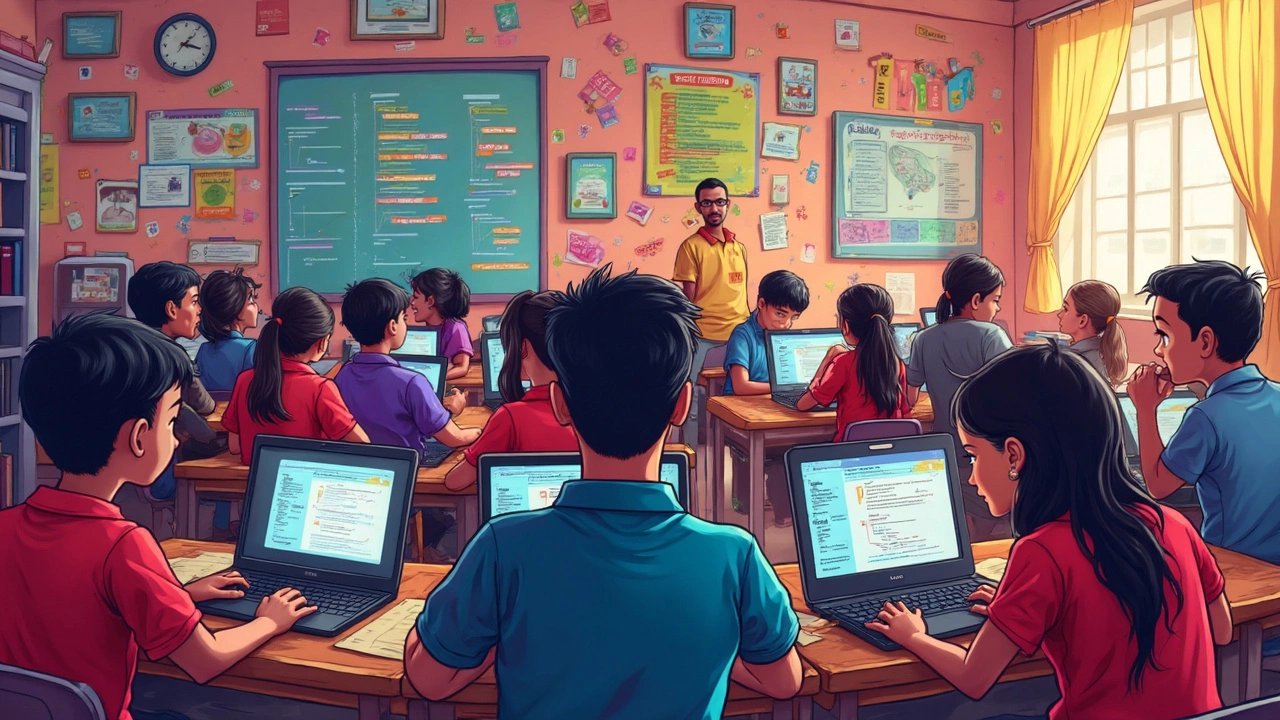Choosing your first programming language can feel like standing in front of a vast, intimidating menu, right? Don't worry; you're not alone! Picking the right language to start your coding journey is crucial because it shapes how you'll perceive and understand programming concepts.
For many beginners, Python is often a top choice. Its syntax is clean and easy to read, kind of like a well-written recipe for your favorite dish. Python also handles a wide range of tasks, from web development to data analysis, making it as versatile as a Swiss Army knife.
On the other hand, if you're thinking about web development, JavaScript is a must-learn. It's everywhere on the web, like those catchy tunes you can't get out of your head. JavaScript works directly in browsers, giving you immediate feedback and letting you see your progress in real-time, which is oh so satisfying!
- Why Language Choice Matters
- Python: The Friendly Giant
- JavaScript: The Web's Best Friend
- Scratch: Fun for Kids and Newbies
- Choosing Based on Goals
- Tips for Starting Your Coding Journey
Why Language Choice Matters
Did you know that the programming language you choose first can really set the stage for how you learn to code? It's like picking the right sneakers before going for a run—it just makes the whole experience smoother and more enjoyable. The right language should be like a good friend: supportive, easy to understand, and encouraging you to take on the world of coding.
One key reason why choosing the best coding for beginners is important is because it affects how quickly you'll pick up concepts. Take Python, for the example we talked about earlier. It's considered one of the easiest languages to learn due to its simple syntax. If you start with something more complex, like C++ or Java, you might get bogged down by their more rigid rules and end up feeling lost.
Different languages also open different doors. Want to build a website? Dive into JavaScript. Interested in data science or machine learning? Python is your go-to. Each language has its own realm where it shines, like a superhero with a unique power.
Understanding Your Goals
A lot of choices depend on what you want to achieve. Are you just trying to learn the basics, or do you have a specific field in mind? For web development enthusiasts, JavaScript is a must because it's essential for creating interactive websites. But if data analysis is your jam, Python will be your reliable buddy.
- JavaScript: Best for web development, and runs directly in browsers.
- Python: Versatile, especially in data science and automation.
- Scratch: Great for kids and absolute beginners, it's like storytelling with blocks.
Choosing the right programming language first is a strategic move. It's about setting yourself up for success and ensuring you don't get overwhelmed. After all, starting with the right language is just as crucial as making sure you're on the right path from the get-go.
Python: The Friendly Giant
Alright, so let's talk about Python—the language that's often the go-to recommendation for those just dipping their toes into coding. Why does it get so much love? Well, for starters, Python's syntax is a lot like plain English, making it super accessible for beginners. You don't need to sweat over convoluted syntax rules; instead, you can focus on grasping the actual programming concepts.
One of the cool things about Python is its versatility. Whether you're looking to delve into web development, data science, or even machine learning, Python has your back. It's got a ton of libraries and frameworks—think of them as pre-packed tools—that can help you build almost anything! For example, Django and Flask are popular for web apps, while NumPy and pandas are a hit in the data analysis world.
Popularity and Community Support
Python is also backed by a massive community, which is a huge bonus when you're just starting out. Need help? Chances are, someone else has asked the same question, and you'll find forums, like Reddit or StackOverflow, buzzing with folks willing to lend a hand.
Fun Fact: Python in Schools
Did you know Python is often the first language taught in schools and universities across the globe? Yup, educators love it because it's easy to learn and yet powerful enough to tackle tough challenges.
Python by the Numbers
Here's a small look at Python's popularity:
| Category | Percentage |
|---|---|
| Usage in Educational Institutions | 80% |
| Usage in Data Science | 70% |
| Overall Programming Language Popularity | 30% |
If you're worried about where to start, hit up resources like free online tutorials or beginner-friendly courses. Platforms like Codecademy or Coursera have loads of options to guide you as you embark on your coding for beginners journey.
JavaScript: The Web's Best Friend
If you've spent any time on the web, you've definitely come across JavaScript in action. It's the magic behind web page interactions and those smooth animations that keep websites lively. As a beginner, understanding JavaScript is like getting the VIP pass to the concert that is web development. It allows you to create dynamic content that can react to user actions, making the user experience a thousand times better.
Why JavaScript?
Think of JavaScript as the Swiss Army knife of the web world. Most browsers come with built-in JavaScript engines, so there's no need to set anything up to see your code in action. It plays well with other languages, letting you add scripts to HTML and CSS seamlessly.
"JavaScript has become the web's native tongue, providing the toolset necessary to construct intricate and engaging user interfaces." - Douglas Crockford, creator of JSON
How JavaScript Makes it Easy
1. Immediate Feedback: With tools like console.log, you can see instant results of your code, making debugging a breeze compared to some languages.
2. Community Support: JavaScript's massive hive of coders online have created tons of resources for newbies, from tutorials to massive open-source libraries.
Not Just Web Pages
While it shines online, JavaScript isn't limited to web browsers. It's also a key player in server-side programming with tools like Node.js, which has turned JavaScript into a full-stack language.
If you're into data about web usage, you'll find it interesting that JavaScript is used by over 97% of all websites as of 2024, according to Web Technology Surveys. This popularity cements its place as a crucial language to learn.
Starting with JavaScript could be your gateway not only to traditional web development but also into understanding how interactive elements are crafted across different digital platforms. Taking that first step might just make JavaScript your best friend on the web too!

Scratch: Fun for Kids and Newbies
Scratch is a fantastic starting point for any budding coder. Created by the good folks at MIT, it's aimed at beginners, especially kids, but it's surprisingly robust for anyone looking to get their feet wet in coding.
Why is Scratch an easy pick? For starters, it uses a drag-and-drop interface. So, you won't have to fuss with syntax errors or remember fiddly rules. Instead, you connect colorful blocks to create simple programs. It's like snapping together digital Lego pieces!
What Can You Do with Scratch?
With Scratch, the possibilities are expansive. Want to create a small game? Or maybe an interactive story? Scratch has you covered. It's popular not just among kids but also educators because it simplifies complex programming concepts like loops and variables.
- Games: Craft simple games where characters move, jump, and interact with each other.
- Stories: Build interactive stories where viewers can choose their path.
- Media Projects: Mix and match sounds, animations, and graphics for creative media presentations.
Impact and Reach
Scratch isn't just a toy—it's the real deal. As of 2023, Scratch boasted over 100 million users worldwide, with countless projects shared every day. Such a community means plenty of tutorials and forums to get help. Plus, sharing projects online with a global community can be super inspiring.
| Age Group | Percentage of Users |
|---|---|
| 6-11 years | 45% |
| 12-17 years | 35% |
| Adults | 20% |
Don't underestimate Scratch's potential. It's a great launchpad into the coding for beginners world and sets the stage for more complex programming languages down the line.
Choosing Based on Goals
When picking a programming language, your goals can make a huge difference in making the decision. Different goals may lead you toward different programming languages, so let’s break it down.
Web Development
If you're looking to dive into web development, JavaScript should be your go-to language. It's the backbone of web technology, running alongside HTML and CSS. Pretty much every interactive feature on a website is powered by JavaScript. If you combine it with libraries like React.js or frameworks like Node.js, you’re on your way to becoming a full-stack developer.
Data Science and Machine Learning
For data science, Python leads the pack. Its popularity skyrocketed in this field because of powerful libraries like Pandas, NumPy, and TensorFlow. It’s like hitting the jackpot if you're into number crunching or teaching computers to think.
Game Development
Got a vision for the next big game? C# and C++ would be great choices. They power stunning graphics with engines like Unity and Unreal. They've been the backbone for many modern games, from indie darlings to AAA hits. They might be a bit tough at first, but the payoff is huge if game dev is your goal.
Mobile App Development
Interested in crafting apps? Swift is the language of choice for iOS apps, while Kotlin is Google’s favorite for Android. They're packed with cool features tailored for mobile platforms, and they're not too tough to grasp either.
Testing and Automation
If testing is your playground, look no further than Python or Java. They're widely used in writing automated scripts and testing even the most complex applications. Java’s robustness and Python’s simplicity make them a dream team for testers.
So, when considering your goals, ask yourself what domain excites you most. Align that with the language that best suits your needs, and you’re off to a great start in the world of coding!
Tips for Starting Your Coding Journey
Getting started with coding doesn't have to be a Herculean task. Here’s some practical wisdom to ease you into this exciting new world.
Start Simple, Stay Motivated
Beginners often feel overwhelmed by the sheer volume of information out there. Stick to one coding for beginners course or book and focus on the basics. Simple programs, like a ‘Hello, World!’ or basic calculator, are perfect warm-ups.
Practice, Practice, Practice
Regular practice is your best ticket to success. Aim to code a little each day. Languages such as Python offer beginner programming tips in abundance, and these can guide your learning.
Break Down Problems
Coding is like solving a puzzle. Instead of attacking the whole thing at once, break your projects into smaller, manageable pieces. Tackle one piece at a time—it's less daunting and more rewarding.
Join a Community
Engage with others who are learning too. Communities online, like Stack Overflow, offer immense support. You'll find answers to your questions and maybe even a few friends along the way.
Use Free Resources
The internet is teeming with free resources. From tutorials on YouTube to open-source projects on GitHub, there’s a world of learning at your fingertips. Don't overlook the power of Google in your coding journey!
Set Realistic Goals
Setting small, realistic goals can keep you focused and driven. Whether it’s completing a coding course or building your first app, each milestone should be celebrated.
Below is a simple breakdown of some free resources you can utilize:
| Resource | Type |
|---|---|
| Codecademy | Online Course |
| W3Schools | Tutorials |
| Coursera | Courses |
With these tips, you'll find that learning to code is not only achievable but also enjoyable. Remember, perseverance is key; every expert was once a beginner.
